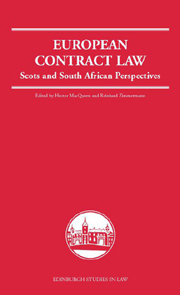Book contents
- Frontmatter
- Contents
- Preface
- List of Contributors
- List of Abbreviations
- 1 Ius Commune and the Principles of European Contract Law: Contemporary Renewal of an Old Idea
- 2 Good Faith
- 3 Offer, Acceptance, and the Moment of Contract Formation
- 4 The Battle of Forms
- 5 Agency
- 6 Threats and Excessive Benefits or Unfair Advantage
- 7 Interpretation
- 8 Third-Party Contracts
- 9 Payment
- 10 Specific Performance and Special Damages
- 11 Termination for Breach of Contract
- 12 Assignment
- 13 Capitalisation of Interest
- Appendix: The Principles of European Contract Law
- List of Cases
- Index
11 - Termination for Breach of Contract
Published online by Cambridge University Press: 05 July 2013
- Frontmatter
- Contents
- Preface
- List of Contributors
- List of Abbreviations
- 1 Ius Commune and the Principles of European Contract Law: Contemporary Renewal of an Old Idea
- 2 Good Faith
- 3 Offer, Acceptance, and the Moment of Contract Formation
- 4 The Battle of Forms
- 5 Agency
- 6 Threats and Excessive Benefits or Unfair Advantage
- 7 Interpretation
- 8 Third-Party Contracts
- 9 Payment
- 10 Specific Performance and Special Damages
- 11 Termination for Breach of Contract
- 12 Assignment
- 13 Capitalisation of Interest
- Appendix: The Principles of European Contract Law
- List of Cases
- Index
Summary
INTRODUCTION
The remedy of termination for breach of contract was introduced into Scots and South African law under the influence especially of English law. In neither Roman nor Roman-Dutch law was there a generalised remedy of termination for breach of contract, as it is known to modern law. Scots and South African law do not, however, mirror English law on all aspects of termination. In a number of instances, the courts have refused indiscriminately to take over all of English law on the subject.
It has been said that the rules on termination upon non-performance of PECL also follow the Common Law rather closely in a number of respects. Similarities between PECL and Scots and South African law on termination are therefore to be expected.
One characteristic of the remedy of termination for non-performance under PECL which is not shared with the Common Law, is that the rules on termination apply equally to breach of contract and to excused non-performance (excused as a result of an impediment beyond the debtor's control). In Scotland and South Africa, as in the Common Law, termination due to excused supervening impossibility of performance is regarded as a doctrinally distinct issue meriting separate treatment from termination as a remedy for breach of contract. To keep this chapter within manageable bounds, only termination as a remedy for breach of contract, and only the following aspects thereof, will be considered:
grounds for termination (in other words, when the remedy is available);
effect, on the availability of the remedy, of a tender to cure the breach; and
consequences of termination.
- Type
- Chapter
- Information
- European Contract LawScots and South African Perspectives, pp. 280 - 306Publisher: Edinburgh University PressPrint publication year: 2006

